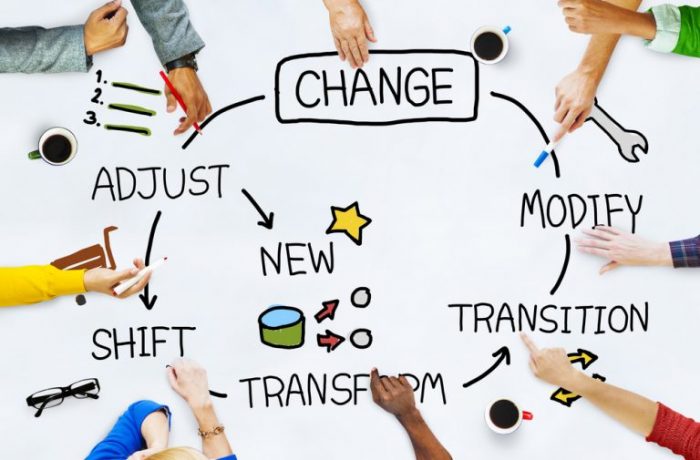It was the morning after the night before. And as the mist from the National Day fireworks cleared, the roar of the jets stopped ringing in our ears, and tears at the meticulously choreographed pageant were wiped away, the word “transformation” seemed justifiably applied to Singapore.

Once ridiculed as the ‘the red dot’, referring to its insignificance on the world map, Singapore is celebrating both its 54th year of independence and its bicentennial. And while it’s been no fairy-tale journey, no overnight glitch-free wonder, the development of Singapore from ‘third world’ fishing village to ‘first world’ economic and political power is, in my book at least, deservedly viewed as a transformation. And that was the vision and plan of those who through half a century have engineered the transformation.
But, ‘transformation’ is a term we’re fond of casually applying to organisational change initiatives and aspirations, much less justifiably, and usually belying the ‘transition’ that’s happening behind the scenes.
‘Transformation’ is the end; ‘transition’ the means. ‘Transformation’ is what I observe from the outside; ‘transition’, what I experienced from the inside. But there’s more to it than that. How we use the term ‘transformation’ typically has a time implication, overnight almost; ‘transition’ takes longer and includes set-backs. And we love a quick fix, so no wonder we’re fond of heralding our change plans as ‘transformations’. But we do so at our peril.
Organisation development and leadership development
It’s been argued that “OD is not “about change”, but about creating great organisations” (Bushe & Marshak 2018) and that “OD can help leaders create change while developing a great organisation”
According to Bushe, models of great organisations that influence OD practice, typically include widespread engagement and inquiry, in which “leaders lead the process and stakeholders decide the changes….” But that implies a certain type of leadership, and also sufficient time. So, what if you don’t have that type of leadership, nor time? Well what you end up with will depend on the type of problem being addressed. Borrowing Heifetz’s (1998) [4]distinction, what he calls Technical Problems are those which lend themselves to solutions that can be implemented quickly by a top down change in rules, processes and procedures.
But difficulties arise when leaders apply a ‘Technical Problem’ approach to what Heifetz calls ‘Adaptive Challenges’. These are the ones requiring shifts in beliefs, values, mindsets and relationships; adaptations requiring experiments and new discoveries that have no guarantees of immediate success. In other words, learning; and continual learning at that.
When leaders approach these as if they were Technical Problem, impose a shiny new TOM (Target Operating Model), a new structure, new policies and systems then you can expect people to respond, at best, with self-preserving compliance or, at worst, with sabotaging rebellion.
So if you’re facing Adaptive Challenges, as most of our big challenges are today, then you’re in the business of ‘transition’ – of reconstruing, fresh sense making, behavioural experiments, the reiterative cycle of action and learning, which takes time. And where that’s not part of the current leadership style, it will also require leadership development (LD).
To face these Adaptive Challenges, Bushe argues we need leadership which models and sustains a culture in which “people feel compelled to speak out, to engage meaningfully, to bring up difficult issues, to reflect on what has taken place and learn from it..”(p8) And if that’s not the style of leadership you’ve got, then there’s your leadership development challenge.
We all know that OD and LD are interdependent, and typically identifying the LD need isn’t the biggest issue; it’s addressing it.
And that brings us back to transformation or transition. If your experience is anything like mine, once an LD need has been identified, senior leaders and programme commissioners often want a quick fix; a transformation. Transition takes too long.
Yet in the world of Leadership Development, sustainable behaviour change is inevitably about the long game of transition, not the overnight ‘wonder’ of transformation. Sadly, as programme commissioners and providers we too often seem to buy into the treasured myth that with just the right content expertly delivered, a short programme will do the trick.
There’s a study that’s still a valid and cautionary on the “Follow-up factor” in management development, by Goldsmith and Morgan. They took a longitudinal look at sustained impact following leadership development programmes and consistently found that the strongest correlation with perceived leadership effectiveness was neither the duration nor content of the programme, but the degree of follow-up.” A supportive and challenging dialogue with colleagues and /or a coach through the cycle of experimental action, review, learning, and more experimental action. Their conclusion? “However it’s done, follow-up is the sine qua non of effective leadership development. Too many companies spend millions of dollars for the “program of the year” but almost nothing on follow-up and reinforcement.”
I guess you’ve been there too, proposing a programme that includes coaching follow up, or even peer facilitated Action Learning Sets, only to have those elements fall prey to savings hungry Procurement requirements, and in the process perpetuating the myth that transformation can be quick and easy, and the awkward and costly reality of transition is best avoided.
So, as OD and LD practitioners, let’s stop colluding with the rhetoric of pain free overnight transformations; let’s challenge the notion that content equates to learning and challenge internal processes which unintentionally squander time and money on leadership development programmes which will ultimately change nothing.
Bushe, G.R. & Marshak, R.J. (2018) Valuing both the journey and the destination in organization development. In D. Jamieson, A. Church, & J. Vogelsang (Eds.), Enacting values-based change: Organization development in action (in press). New York, NY: Palgrave Macmillan.
Bushe, G.R (2017) “Where Organisation Development Thrives”. Roffey Park Institute. (p6)
Heifetz, R. A. (1998). Leadership without easy answers. Cambridge, MA: Harvard University Press.
Leadership Is a Contact Sport: The “Follow-up Factor” in Management Development Marshall Goldsmith and Howard Morgan ORGANIZATIONS & PEOPLE August 25, 2004 / Fall 2004 / Issue 36 (originally published by Booz & Company





